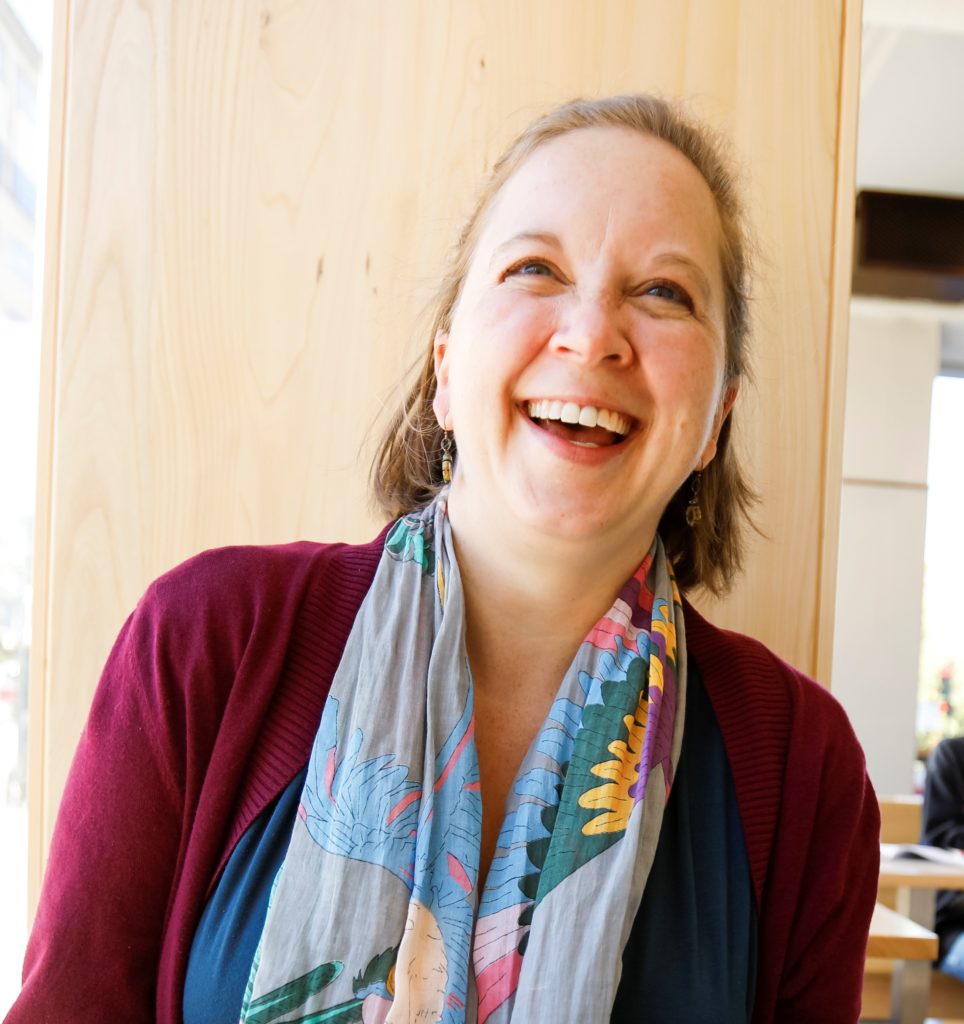
Lindsay Christians | Conferences, events, and food

Journalist Lindsay Christians, whose professional home base is Madison, Wisconsin’s The Capital Times, has been a member of ATCA for almost 15 years. During that time, she has been deeply involved in playwright awards and conference planning committees. In recent years, she has been a leader in moving ATCA into digital event development. With her tenure as chair of the Conference & Event committee coming to a close, and a book addressing her passionate interest in food and wine newly published, we took the opportunity to find out more about Lindsay, her vision for what ATCA has done for her, reflections on what she has done for ATCA, and what might come next.
How long have you been a member of ATCA? What led you to join initially?
I joined ATCA in 2007 when I was in graduate school at the University of Wisconsin-Madison, because I was hoping to snag a scholarship to the O’Neill National Critics Institute. In 2009 I did, and spent two very warm, exhausting, wonderful weeks at NCI. My first conference was in Chicago in 2012.
Do you see yourself as a theater critic or an arts journalist or some blend of the two?
I’m a journalist. My job is to tell readers what happened last night, and to bring as much context and clarity as I can to that. Because trust is the core of this work, I always request scripts for fact-checking purposes. I like to have a sense of which choices come from the script and which come from the director/ actors.
I write for readers, not theater creators. The playwright, director and actors have their opportunity to say what they want to say. A review is an opportunity to respond to that work. I try, always, to get it “right” — ideally, any weaknesses I point out will be ones a good director already knows are there.
The best criticism starts conversations. I engage with readers whenever I can. I think that’s an essential part of our work in our communities.
What committees or activities have you engaged in most in ATCA?
Right away, I started on the play reading committee for the Steinberg and Osborn awards. That’s always been a major reason I’ve stayed a member because it’s how I get to experience new plays! I was at the original meeting of the Belonging, Equity, Inclusion & Diversity committee in Milwaukee in 2018 (when it was called the Diversity & Inclusion committee) and joined officially about a year later. I’ve been part of the ATCA Conference & Event committee for about 18 months.
You were one of the organizers of the ATCA annual meeting in Spring Green, Wisconsin in 2018. Was that the first time you got deeply involved in ATCA committees and planning efforts? Tell me about that experience, and how that led you into becoming so involved in ATCA event planning over the past few years.
I am so proud of that conference! It was an extraordinary amount of work, and a major chunk of it was handled by American Players Theatre folks — specifically Sara Young and Carrie Van Hallgren. They are generous, excessively organized, and ridiculously capable, and I could not have done half of it without them.
I do think that planning that conference informs my advice to ATCA about future conferences. The majority of our membership is no longer employed by newspapers and/or magazines, which means conference costs must come out of pocket. The outlets for which we write (including many personal websites) are likely to have small and/or regional readership. To me, that indicates more regional conferences with fewer costs involved, to maximize the benefit both attendees and theaters receive.
Part of what made Spring Green such a heavy lift was location. The theater itself was impressive and the panels were excellent. But the resort couldn’t staff its restaurant and had spotty wi-fi, though they’d reassured us about both many times prior to the event. We hired a shuttle, but we also drove many of the critics the hour to and from the airport in our own cars.
One critic I was driving back to the airport referred to me, after five days of the conference, as an employee of the theater. That was a disheartening moment.
I think, overall, we can do better as an organization appreciating the volunteer work done not only by our own members, but by the theaters we ask to accommodate us. Some people are wonderful about this! But it’s a message we still need to hear.
You were part of the committee that planned the first all-digital ATCA annual meeting in November 2020 ATCA2020: The Next Normal that we organized using our old website. Frank Rizzo, one of the event planners, reflected on the process of this pandemic inspired move to digital in an interview in October 2020. After that conference, you took over as chair of the Conference & Event committee and led the development of regular monthly Zoom seminars for ATCA members and the public at large. The committee developed our latest annual digital conference ATCA2021: From Where We Sit in November 2021, rolling out all our new website and event management software. I’d love to hear your reflections on where ATCA was and where it is now related to event planning. Digital is here to stay.
It really is! As Frank indicated in that interview, our events planning team is lights out; we have had great forward momentum to keep planning events for members over Zoom.
We learned some things at the first virtual conference. For example: on Zoom shorter sessions, an hour or less, are better. Members tend to prefer live events, because we’re a curious, chatty bunch and we like to ask questions. We offered more space for conversation between panels, where people could also stretch and relax. This went over well.
I think we still need to work on publicizing our panels and discussions and come up with better ways to connect members with each other when they’re not in the same city. We have a lot to learn from each other and opportunities for connections that we are still trying to cultivate.
Now that new routines for regular virtual seminars and some mix of virtual and in-person events have been established for ATCA, you have announced that you will step down as chair of the Conference & Event committee. What would you like to say about the nature of the job and who might best be suited to fill it? What are the opportunities and challenges you see ahead for ATCA programming for its members and for the field of theater criticism and arts journalism?
I think the important thing about the chair position is to keep an eye on schedules and keep things consistent – every week or every month or some other announced timeline.We’re all volunteers and we all have our own jobs, families, and extracurriculars. Keeping an eye on dates and publicizing early is key.
As Frank has said, it would be good to have more diverse and younger leadership in planning events. Many of us are willing to stay on to help, but we’d like more diverse voices in the mix.
Moving ahead, ATCA can always involve more critics, both established writers and newcomers to the field. We should reach out directly! Challenges include creating events, whether in person or over Zoom, and opportunities for discussion that will keep them engaged and help all of us grow.
Another challenge is financial. Critics should be paid for their work — professional writers should be paid. Especially as a generation of writers without excess disposable income and/or generational wealth enter the field, including writers from historically marginalized communities, to say this work can or should be done for free is a slippery slope. So I’d love to see ATCA be more deliberate and active in cultivating paid work for members.
You are a published author, and have a new book out. Tell us about it and where we might obtain a copy!

Yes, today! My other hat at the Cap Times is food editor. In 2017, I began reporting on a book for a local academic press called Madison Chefs: Stories of Food, Farms and People. It’s a series of profiles of nine chefs, with 150 color photos and 28 recipes.
I believe I am the only ATCA member in Madison, so it definitely has regional appeal. But if you wanted to do a book like this in your own community, this was a fascinating exercise in writing a recent history. I interviewed the chefs and spent time in their kitchens. Then I talked to their mentors, parents, farmers they work with closely, servers and fellow cooks. And I did a deep dive into the newspaper archive — reading obits for people’s grandparents, finding that one news story that went the 2000 version of “viral.” I also made records requests.
So it’s not a fluffy book; it’s a series of reported essays. It was really interesting to write, and I’d love to share the process with anyone else who’d be curious about it.
I like telling people to go to indiebound.org and bookshop.org or a local bookstore, when possible. It’s also available directly through UW Press.
Where can people find your work on line? What have you written recently you’d like to share?
- My portfolio’s here.
- I reviewed “Bug” in November at Steppenwolf in Chicago — that was fun/ creepy.
- The paper published an excerpt of my book last week! Which was so nice.
– Interview by Martha Wade Steketee. Edited for length and clarity.





Sorry, the comment form is closed at this time.